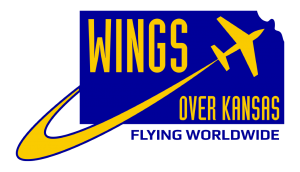| This article originally appeared in the Eagle. |
By Dennis Pearce
The Wichita Eagle
Russ Campbell uses the word “lucky” a lot when he talks about his World War II days of flying the Army Air Corps’ hottest fighter at the time — the P-47M.
“See, you have to be awful lucky to get through a war,” the 76-year-old Wichitan said recently.
One brush with death came when he was rolling down the runway taking off from Boxford, north of Colchester, England, and a 165-gallon fuel tank fell off an airplane taking off in front of him.
“I hit it with my right wheel and it exploded. I got the hell off the runway as quickly as I could.”
The airplane skidded and started to burn, the ammunition started to explode and there was Campbell, thinking he was stuck, trying to get out of the cockpit.
“Then I realized, ‘You dumb nut. All you have to do is flip off your helmet,’ ” — which connected him to the airplane with radio and oxygen lines — and out he went.
“You know, you got to be lucky.”
He had a second close shave when he and his fellow pilots ran into a 100 mph headwind coming back to England from Europe. The heavy winds were no threat physically to the airplanes, but it slowed them down so much they ran out of fuel.
Campbell bellied his airplane south of Paris and walked away from the wreckage.
The hardy P-47 fighter served as both a bomber escort on raids into Germany and as a fighter-bomber, strafing and bombing trains, trucks, tanks, whatever pilots could spot. One of Campbell’s squadron mates came back to base with part of a tree
embedded in the wing of the rugged fighter.
Campbell has covered the walls of the basement of his Wichita home with pictures and other memorabilia, such as a German army helmet he brought back from Europe. His pool table is stacked with military publications, more photographs and
aviation gear.
Campbell ended the war with 173 combat hours spread over 37 missions. He never shot anyone down, and no enemy pilot ever hit him, either.
Getting into a dogfight “is a matter of being in the right place at the right time.”
Pilots such as Dave Schilling, who was credited with 34 1/2 kills, made their own luck, said Campbell, who flew as Schilling’s wingman occasionally.
“I’d look for a puff of black smoke out of his exhaust,” Campbell said, as Schilling pushed the throttle forward, racing to attack the enemy airplanes. Only then, Campbell said, would Schilling call out the enemy planes to the others in his group.
The former Schilling Air Force Base, now Salina Municipal Airport, was named in honor of Schilling, who was killed in an automobile crash in England after the war.
The fighter pilots he served with, Campbell said, fit the popular mold. “They were a different breed,” he said.
Campbell was a member of the 56th Fighter Group, 63rd Fighter Squadron, based in England during the winter of 1944-45.
He left the Air Force as a major. He spent more than 30 years as a printing salesman for McCormick-Armstrong Inc., coming to Wichita from his native Iowa at the suggestion of fellow squadron member, Dick Anderson.
Traveling by car and a Beech Bonanza airplane, Campbell oversaw printing for such customers as Beech Aircraft Corp., TWA Inc. and many of the businesses in the resort town of Branson, Mo.
Combat flying “was a thrill. You were tensed up all the time, which you should be. And when it was all over, you looked back, and saw a lot of things that happened, some good, some bad,” he said.
All in all, Campbell said, having survived the war and two airplane crashes: “You had to be lucky to get through like I did.”
© The Wichita Eagle
